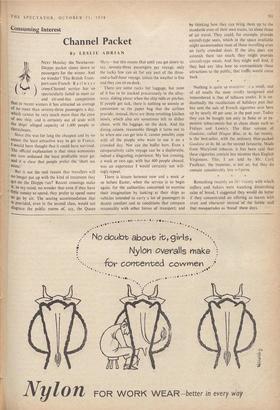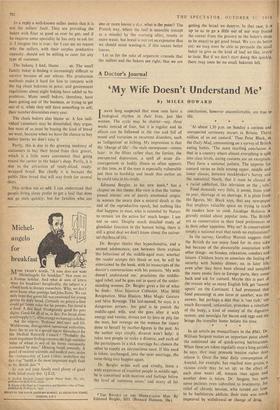Consuming Interest
Channel Packet
By LESLIE ADRIAN
NEXT Monday the Newhaven: Dieppe packet closes down to passengers for the winter. And no wonder ! This British Trans- (• cross-Channel service R ail w a ysross-Channel service has so spectacularly failed to meet air and air-and-bus competition that in recent winters it has attracted an average of no more than seventy-three passengers a day. which cannot be very much more than the crew of one ship, and is certainly out of scale with the ships' alleged capacity of 1,400 people or thereabouts.
Since this was for long the cheapest and by no means the least attractive way to get to France, I would have thought that it could have survived. The official explanation is that since economies are now ordained the least profitable must go; and it is clear that people prefer the 'short sea route.'
But is not the real reason that travellers' will no longer put up with the kind of treatment they get on the Dieppe run? Recent crossings make it, to my mind, no wonder that even if they have little money to spend, they prefer to spend more to go by air. The seating accommodation that is provided, even in the second class, would not disgrace the public rooms of, say, the Queen Mary—but this means that until you get down to, say, seventy-three passengers per voyage, only the lucky few can sit for any part of the three- and-a-half-hour voyage, unless the weather is fine and they can sit on deck. • There are some racks for luggage, but most of it has to be stacked precariously in the alley- ways, sliding about when the ship rolls or pitches. If people get sick, there is nothing so seemly or convenient as the paper bag that the airlines provide; instead, there are those revolting kitchen bowls, which also are sometimes left to slither about, with the luggage, on the deck. And the dining, saloon, reasonable though it turns out to be when one can get into it, cannot possibly cope with all the people who want to use it on a crowded day. Nor can the buffet bars. Even a comparatively calm voyage can be a deplorable, indeed a disgusting, experience. My last crossing. a week or two ago, with but 400 people aboard, was an experience I would certainly not will- ingly repeat.
There is leisure between now and a week or so before Easter, when the service is to begin again, for the authorities concerned to exercise their imagination by looking at their ships as vehicles intended to carry a lot of passengers in decent comfort and in conditions that compare reasonably with other forms of transport; and by thinking how they can bring them up to the standards even of their own trains, let alone those of air travel. They could, for example, provide aircraft-type seats, which in the space available might accommodate most of those travelling even on fairly crowded days. If the idea does not astonish them too much, they might provide aircraft-type meals. And they might well find, if they had any idea how to communicate these attractions to the public, that traffic would come back.
Nothing is quite so evocative .-s a smell, and of all smells the most vividly recognised and remembered is that of tobacco smoke. It is un- doubtedly the recollection of holidays past that has sent the sale of French cigarettes over here up by nearly 40 per cent. in the past year. Today they can be bought not only in Soho or at ex- pensive tobacconists but at chain shops such as Finlays and Lewis's. The filter version of Guuloise, called Disque Blue. at 4s. for twenty, is the best-seller, with the ordinary blue-packed Guuloise at 4s. 8d. as the second favourite. Made from Maryland tobacco, it has been said that these cigarettes contain less nicotine than English Virginians. This, I am told by Mr. Cyril Faulkner, the importer, is not so; but they do contain considerably less y'l:netre.
* * *
Remarking recently on th :rixiety with which millers and bakers were watching diminishing sales of bread, I suggested they would do better if they concentrated on offering us loaves with crust and character instead of the feeble stuff that masquerades as 'bread' these days. ; reply a well-known miller insists that it is le millers' fault. They are providing the with flour as good as ever he got; and if quires some speciality he has only to ask for nagine this is true: for I can see no reason he millers, with their surplus productive ity, should not be willing to cater for any of customer.
bakers, 1 find, blame . . . us. The small , baker is finding it increasingly difficult to e because of our whims. His production ds make it hard for him to compete with g chain bakeries in price; and government tions about night baking have added to his !ms. Many small bakers, therefore, have getting out of the business, or trying to get ' it, while they still have something to sell; lumber diminishes every year.
chain bakers also blame us. A few indi- customers may be dissatisfied, they argue, ost of us must be buying the kind of bread nt, because when we have the chance to buy loaves we don't take it.
sly, this is due to the growing tendency of riers to buy their bread from their grocer, is a little more convenient than going the corner to the baker's shop. Partly,, it is o the attraction of ready-sliced, ready- ed bread. But chiefly it is because the likes bread that will stay fresh for several strikes me as odd. I can understand that living alone prefer to get a loaf that does stale quickly; but for families who use In a not t baker he req it. I ii why capac type The family surviv meth the bi regula proble been out of their n The vidual but m we wa better Pa r Gusto which round due t wrapp public days.
This people not go one or more loaves a day, what is the point? The French way, where the loaf is unusable (except as a missile) by the morning after, results in more waste; but bread is not yet so expensive that we should mind wasting-it, if this means better loaves. • Let us for the sake of argument concede that the millers and the bakers are right; that we are getting the bread we deserve. In that case, it is up to us to go a little out of our way (round the corner from the grocery to the baker's shop, to be exact) to get good bread. We can do better yet; we may even be able to persuade the small baker to give us the kind of loaf we like, crusty to taste. But if we don't start doing this quickly, there may soon be no small bakeries left.



































 Previous page
Previous page